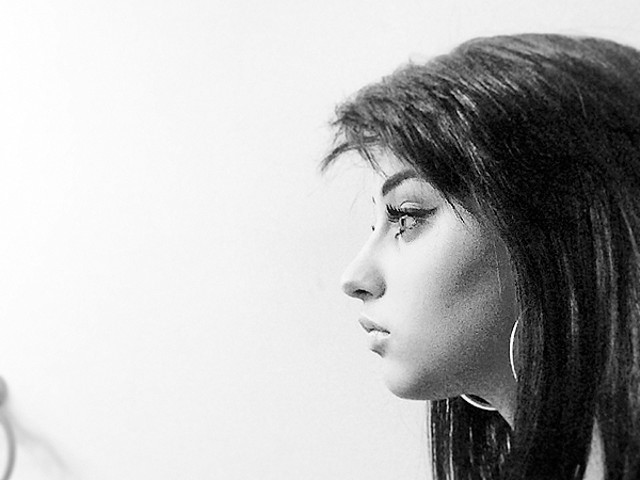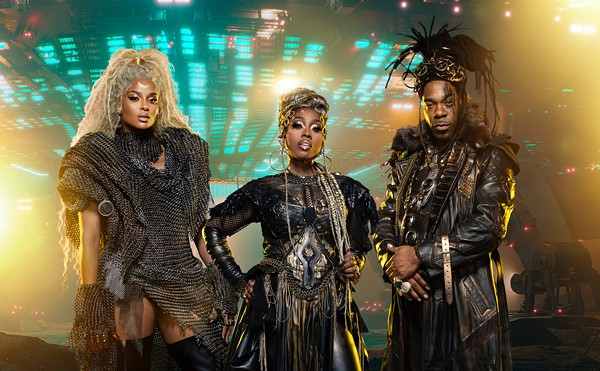Detroit Hip-Hop
Detroit hip-hop, Royce says, is "more advanced than when we were younger. Kids have a lot more opportunities to get on, I think. We started off where we were just fighting to get on the radio, and I see Detroit showing a lot more support than when we first started. To hear a song on the radio by Dej Loaf and Big Sean, people like that ... [to know] they're working or they have opportunities. I think they're growing here. I feel like Detroit always had some of the illest emcees."
"We've always had talent here," says Mathers. "But we've never really had the platform or the ability to — there's so many more outlets now with the Internet and things that these kids can create opportunities for themselves. Make a hot song and put it up. You can make a name like that. With us, when we were first coming up, it was like, if we don't get some kind of song on the radio here in Detroit, we're fucked."
"I think Detroit hip-hop today is really balanced," says Rosenberg. "I think that, when you look at the type of artists that are not just locally but are nationally recognized, you can get a good view of what's really here. You think about people like Eminem, Big Sean, Royce, Danny Brown, even Dej Loaf now, who's got some national radio play — that's a really broad spectrum of artists. It's great to see that. I think that Detroit's recognized as a scene now, and I think that back when we were first coming up, that was our goal: to make it recognizable as a scene, so I think we accomplished that.
"When people think about a Detroit emcee, I think the first thing they do is respect the idea, because they know it's going to be somebody who can really fucking rap," Rosenberg continues. "Someone who can come for your head and who's real, and it's not going to be any fake shit."
"And I don't think it's any particular style that they associate it with either," adds Royce. "Probably the closest that it's been since the Motown era just in terms of variety and notoriety, all the different moving parts. And the unity. Everybody's supporting each other as well. It's good right now."
And New Detroit
The group has some perspective on the rapid changes of Detroit.
"We should be happy they're not talking about a murder rate and all that," says Porter. "I'm happy they're not talking about that. That was like, the worst thing."
"You can't just put businesses [downtown and in Midtown] and expect everything else to change," says Rosenberg. "There's got to be more. It's a good anchor and a good draw for people to come to Detroit, spend time there, spend money there, live there, and I mean in downtown and the city, but that doesn't necessarily change the surrounding areas, the surrounding communities. That money needs to be put back in to fix those kind of problems that Denaun just mentioned. You can't just open up stores and expect people to stop shooting each other."
"I would love to see them put some more," says Porter. "I've spoken a couple times at schools, and I really would love to see them put more music programs back into the schools. They took that away and that was like, that was something that I think that got us all really started. When you lose that, all you have is sports. There's so much more to life than just that. Art in general. Taking the arts away from schools: that's a bad thing. If anybody is trying to bring anything to the city, I would definitely love to see that."
We ask if there is anything they want Detroiters to know.
"It's just hard, if not harder, to maintain something than it is to get it in the first place," advises Mathers. "When you struggle for so long and you worked so hard to get something, once you get it, you have to keep it. You can't slow down; you can't stop, you know what I'm saying? You have to work. Sometimes I feel like I work almost twice as hard to maintain it than I did to get it. Me, 15 years ago, I had to put myself in that mind frame to really remember or try to remember how I felt, but at the same time I feel like I work at least as hard to maintain, and I think we all do. To know that it's possible to have something last if you keep at it, you know. You can't just get it and be like, 'Oh, I've got it,' and try to put out one album and be like, 'I don't got to do shit now. I'll just coast through my next one' or whatever."
"That's how you don't make it to 15 years," adds Rosenberg.
"That part is cool," says Mathers. "Being able to be blessed to do that."
"Totally blessed," adds Porter.
White Men Can't Jump
We ask if, when they first met each other two decades ago, they thought they would be where they are today. They all laugh. "I had different goals," says Royce. "I probably, at that moment, wanted to have a better verse than somebody or something. 'Maybe I can out-rap Canibus one day,' or something," he laughs.
"Do you still think you're going to be able to out-rap Canibus one day?" asks Rosenberg.
"It's a toss-up," is Royce's answer, with a smile.
Back then, says Mathers, "It was whatever was going on at that moment and trying to be the best rapper that I could possibly be." His focus, he says, was on that.
"Your dreams get bigger after you do things," says Porter. "But what we wanted to do? It was a lot smaller."
"The goal was to not have to struggle and work regular jobs," says Mathers. "'Man, if we could just make a living. Just do some shows and get paid a couple hundred bucks a night or something, but do what we love to do.' And just make enough to just get by and make a decent living, that's all we really cared about."
"If I made what a painter makes and was getting paid what a painter made doing what I was doing, I made it," says Porter. "That was it."
"Hopefully what we've done is somewhat inspiring, you know?" says Rosenberg. "Marshall and I — I'm not from Detroit proper, but I'm from the Detroit suburbs, Marshall's from Detroit proper — we're just a couple of guys who really were extremely passionate about music and created this globally recognized brand from nothing. Hopefully people can see some inspiration in that and be inspired the way that Marshall and I were by things like Def Jam, by things like Aftermath, to be able to create their own version of that."
We ask how everyone first met, and the men get excited reflecting. "Eye-Kyu told me that Em needed some beats, and I had been doing beats for like, three or four months," says Porter.
"We found out, once we were introduced, that we pretty much grew up fucking five blocks from each other," says Mathers. "He lived on Rowe and I lived on Dresden and it was, like, five blocks down the street."
"I would walk past his house all the time to go to school," adds Porter.
"But we never knew each other," says Mathers.
Rosenberg asks if Proof had known both of them.
"I was skipping school at the time," says Porter, "and Proof came up to high school and he was like, 'Oh, man, this white boy came up here and out-rapped everybody.' And it was him!"
"Proof used to sneak me in the lunchroom sometimes," says Mathers with a sly smile. "We would go up to Osborn [High School] and I would rap in the lunchroom and battle."
It was kind of like a cipher, Porter explains.
"It was kind of like that," says Mathers, "but whoever had the best verse, Proof would put money on or whatever."
But Rosenberg has a slightly different take:
"Didn't he try the White Men Can't Jump trick with you?" he asks.
"He made a lot of money in school like that," Porter says with a laugh.
"Proof saw White Men Can't Jump and used Em as Woody Harrelson to his Wesley Snipes," Rosenberg explains.
After so many years, the artists carry a demeanor of comfort, filled with gratitude for what they are achieving — gratitude especially for Detroit.
"I think we all really appreciate the support this city has given us throughout the years," says Rosenberg, "and we try to give back. We try to do things here that other cities don't get like when we go and do this tour that we did with Rihanna, we only did three cities and Detroit was one of them. Detroit's not the biggest market in the country, but we want to make sure we do stuff at home. We're always focused on doing stuff here, and we appreciate all the support that the city's given us, especially our fans."
"That's what we're thankful for," says Rosenberg. "Detroit."
And to that Mathers closes out our interview with an "Amen."
Shady XV is available on Nov. 24.





